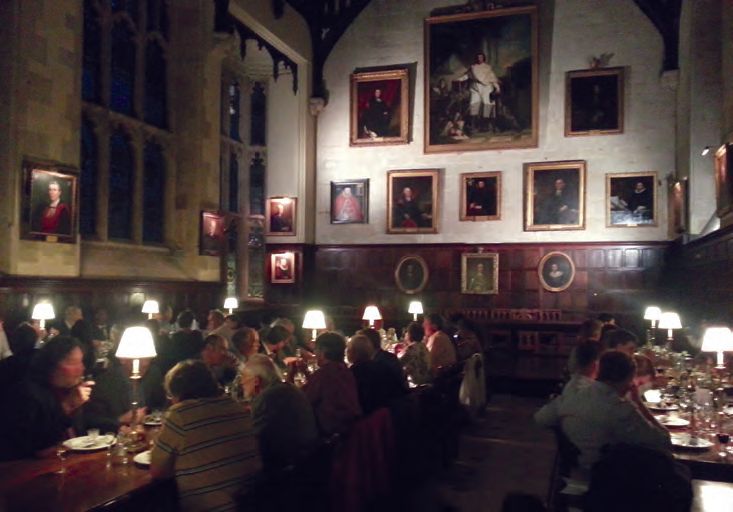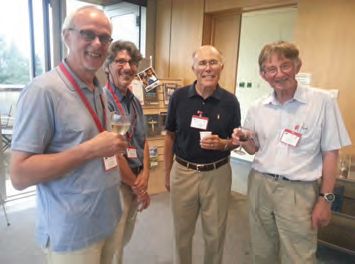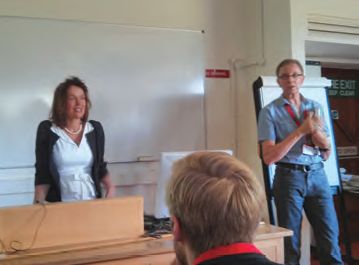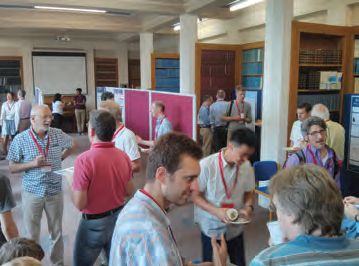
Physiology News Magazine
Meeting Notes: The ‘H+SSS’ing of Summer Lawns
Events
Meeting Notes: The ‘H+SSS’ing of Summer Lawns
Events
Richard Vaughan-Jones
University of Oxford, UK
Deputy President, The Physiological Society
https://doi.org/10.36866/pn.93.20
27–30 July 2013, University of Oxford, UK

The folk/jazz singer, Joni Mitchell, rhapsodised once about the sounds of summer, encapsulated by the hissing of lawn-sprinklers. In July, the lawns of Keble and Exeter Colleges at Oxford were crisping in the summer heat. The H+SSS was not of lawn-sprinklers, however, but of H+ ions being transported within proteins and across cell membranes. The IUPS Satellite Symposium, “H+ ion Sensing, Signalling and Servo-control” (H+SSS, for short), was held in the closing days of July in Oxford, immediately following the main Physiological Congress in Birmingham. These were also the last days before the heat of summer broke in the UK. Indeed, the humidity forced the 65 delegates at the meeting to move to another room, but not before Carol Robinson DBE, FRS (Oxford, UK) had delivered her masterly Plenary Lecture. With remarkable clarity, she led the audience of membrane transport physiologists through the complexities of mass spectrometry, a research field that she has revolutionised. By examining membrane proteins stabilised in a gas phase she has, for the first time, been able to view 3-D multimeric interactions associated with ion pumping by the V-type H+-ATPase. Despite the summer heat, she held the full attention of her audience. After that, the temperature was taken down, but the scientific quality maintained, by decamping to a cooler lecture theatre. This was Plan B, and fortunately it worked!
The Department of Physiology, Anatomy & Genetics (DPAG) at Oxford played host to the H+SSS Conference, organised by Richard Vaughan-Jones (Oxford, UK), and Walter Boron (Cleveland, USA). Accommodation was at nearby Keble College, with a Conference Banquet held at Exeter College. H+SSS was the first major gathering for several years of cellular physiologists engaged in the study of intracellular pH regulation, a fundamental cellular control system of major importance in health and disease. Roger Thomas FRS had co-hosted one such meeting at the CIBA Foundation in London in 1987, at premises now occupied by the Academy of Medical Sciences, while Walter Boron hosted another in Snowmass, Colorado in 1996. But apart from important regional meetings in Banff, Canada and Aarhus, Denmark, the field has lacked a recent scientific focus. It was a pleasure, therefore, to see the enthusiasm and rigour that emerged at the international H+SSS conference in Oxford.
In addition to the H+-ATPase discussed by Carol Robinson, there were scientific sessions devoted to the principal membrane transport families involved in cellular and organ acid/base regulation, including Na+- and Cl–coupled HCO3- transporters, Na+/H+ exchangers, and monocarboxylic acid transporters (MCTs). One session focussed on H+ ion sensing and metabolism by mitochondria, and H+ ion coupling to intracellular Ca2+ and electrical membrane signalling. Other sessions were dedicated to H+ and HCO3- ion fluxes in vascular, intestinal, renal and neuronal systems, as well as in cancer. This latter session represented a re-awakening of major interest in the importance of pH-control to cell proliferation and development.
H+SSS was delighted to welcome speakers from nine different countries on three continents, including the USA, Europe and the Far East. Subsequent feedback from delegates who attended the meeting has been very positive. So it is hoped that the “H+SSS”ing of summer lawns will not be a faded memory from a lost summer in Oxford. It should be reconvened and re-watered at regular intervals. Volunteers?
With grateful thanks to the Nora Eccles Harrison Cardiovascular Research & Training Institute, Salt Lake City, USA, and B & B Microscopes Ltd, Pittsburgh, USA for funding assistance, and Mrs Mala Gunadasa-Rohling for administrative help.



